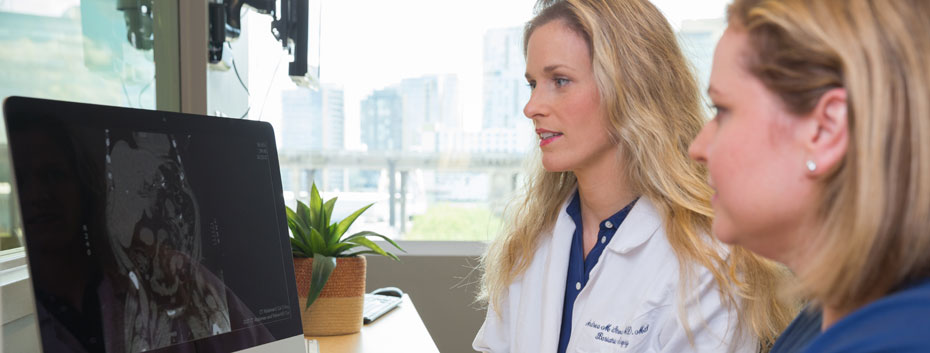Revisional Bariatric Surgery

OHSU is Oregon’s leading hospital for revisional bariatric surgery, with referrals from across the region. This surgery treats the small fraction of patients with complications or poor results after an earlier bariatric surgery. At OHSU, you’ll find:
- Surgeons who do dozens of these surgeries a year.
- Minimally invasive techniques, even if your first surgery used a large incision.
- Evaluations for anyone considering this surgery or who wants a second opinion.
What is revisional bariatric surgery?
Revisional surgery adjusts or reverses your original bariatric procedure. About one in 20 patients who’ve had a bariatric surgery sometime in the past need another surgery because of complications or too-little weight loss.
How revisional surgery is done
Most are done with a laparoscope. This uses small incisions to insert a tiny camera and instruments. You have less pain and quicker recovery. In relatively few cases, surgery is open and uses a larger incision.
Bariatric revisions: surgical options
Converting gastric banding: Our most common surgery changes gastric banding to gastric bypass or gastric sleeve. About one in four patients with a gastric band needs it removed within five to 10 years.
Converting stomach stapling: We also convert horizontal gastroplasty (stomach stapling) to gastric bypass or gastric sleeve. This 1970s-era method is no longer used because of high rates of complications and low rates of significant weight loss.
What to expect
Hospital stay: If your surgery is laparoscopic, you’ll probably stay one or two nights. If it’s an open procedure, you may spend four to seven days.
Activity:
- Most patients can walk three to four hours after surgery. Most also can resume daily tasks such as showering almost immediately.
- You should be able to fix meals and do other small tasks when you get home. You can slowly increase activity over the next few weeks. Learn more about life after surgery.
Diet: You’ll have liquids for the first one to three days. You’ll slowly add solid foods in stages for about three months before you settle into a long-term diet.
Weight loss: Patients who convert to gastric bypass or gastric sleeve have the same success rates as patients who have those surgeries to start with. Most patients lose at least half their excess weight and keep it off for years.
Advantages
- Revisional surgery can be as effective as a first-time bariatric surgery in reducing weight and improving obesity-related medical problems.
- At OHSU, your care team will carefully assess your needs. The team will work with you to find the best option to give you a second chance at success.
Risks and potential side effects
- The risk of complications is higher in revisional surgery.
- Nationwide, about 3 percent of patients have complications within 30 days, such as bleeding, leakage and infection, research shows.
- Most long-term risks are similar to those of first-time bariatric surgeries.
- On occasion, a laparoscopic operation must become an open one because of scar tissue. That increases the risk of surgical complications.
Is revisional surgery right for me?
Talk to your surgeon or primary care provider about any physical problems that won’t go away. That’s particularly important for persistent digestive issues such as acid reflux.
Our team of surgeons, nurse practitioners, dietitians, psychologists and physical therapists will examine your physical and mental health in detail. If you are a candidate for revisional surgery, we will recommend the safest option.
You may be a candidate if:
- You have one or more complications from a previous bariatric surgery. For example, your gastric band may have slipped or your gastric sleeve may be leaking.
- You did not lose enough weight.
- Your original surgery did not do enough to improve a related condition such as Type 2 diabetes or sleep anea.
- You had bariatric surgery, particularly stomach stapling, decades ago.
For patients
Get started:
- Register for our online seminar.
- Try our BMI calculator.
- You do not need a doctor's referral for bariatric treatment at OHSU.
Questions?
- Call us at 503-494-1983
- Email us at w8reduce@ohsu.edu
Locations
Bariatric Surgery Clinic, South Waterfront
Center for Health & Healing, Building 2, eighth floor
3485 S. Bond Ave.
Portland, OR 97239
Digestive Health and General Surgery
Hillsboro Medical Center, 7th Avenue Medical Plaza
333 S.E. Seventh Ave., Suite 5200
Hillsboro, OR 97123
Adventist Health Multi-Specialty Surgery Clinic
10000 S.E. Main St., Suite 316
Portland, OR 97216
Free parking for patients and visitors
Refer a patient
- Refer your patient to OHSU
- Call 503-494-4567 to seek provider-to-provider advice